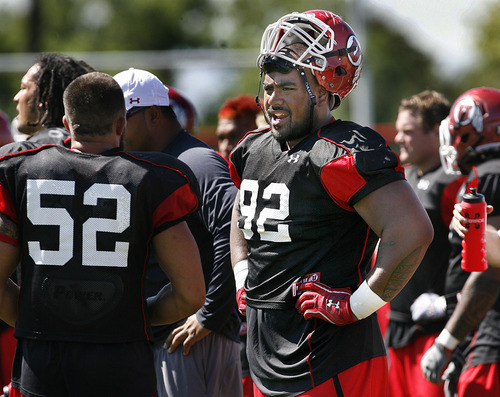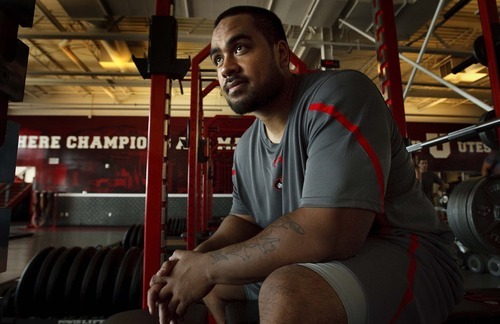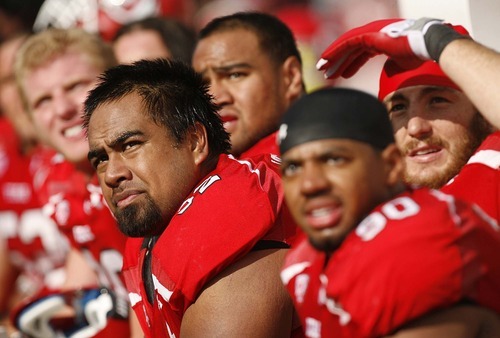This is an archived article that was published on sltrib.com in 2012, and information in the article may be outdated. It is provided only for personal research purposes and may not be reprinted.
When it came to adjusting to life in the Pac-12, Utah coach Kyle Whittingham liked how his team measured up in 2011. The one exception was along the lines, where on film Whittingham consistently saw his linemen at a disadvantage. Seeing them get pushed around by bigger, stronger guys frustrated him.
"That was the one area where we were deficient," Whittingham said. "We didn't know what to expect in the Pac-12 schedule, and we saw firsthand we needed to get bigger and stronger to compete."
The Utes have always relied on speed, but in the world of the Pac-12, size apparently does matter. Bulking up the lines was a priority for them in the offseason and now they boast two of the biggest lines in the league. The offensive line has an average weight of 309.4 pounds and the defensive front has an average weight of 287.5.
Those numbers should give the Utes an advantage when they play Arizona State this week, which averages 292.4 on its offensive line and 265 pounds on its defensive front.
Granted, the Utes' offensive line continues to evolve with young players who have limited experience in starting roles, but at least they have the bulk, with freshmen such as 322-pound Jeremiah Poutasi and 305-pound Kala Friel in the rotation.
The Utes are faring even better on the defensive side of the ball where tackles Dave Kruger, Tenny Palepoi and Star Lotulelei clock in at 300 pounds or more. The Utes had hoped to have Junior Salt among that group, but the 330-pound junior college transfer suffered a season-ending foot injury during fall camp.
That the Utes must now have a full line of 300-pounders in order to compete in the Pac-12 makes even Whittingham pause.
"When I played you'd maybe come across a 300-pounder once in the course of a season," he said. "Now every single guy on the two-deep needs to be 300 pounds. The game has gotten so physical, you need that kind of size to compete."
The Utes aren't just signing bigger players. Many veterans say they worked to add weight in the offseason. An example is sophomore defensive lineman Nate Fakahafua, who said he has added close to 30 pounds to his 6-foot-3 frame since he has been with the program.
"I eat so much, sometimes I feel like I'm going to get sick," he said. "But I'm still trying to add more. I know I need to get even bigger."
Having the bulk inside makes life on the edges easier, said defensive end Trevor Reilly, who is a relatively little guy among the Utah defenders at 6-5, 245 pounds.
"Four years ago when we had Zane Taylor here, he was 300 pounds and I thought he was a big guy," Reilly said. "Now some teams are like the NFL, especially on the interior. With us, when you have guys like Star in there, it's a lot harder for teams to push us around."
The key for the Utes in making the size work for them is maintaining the speed for which they have become known.
A reminder that it takes more than bulk to play the game is the plight of offensive lineman Carlos Lozano. The junior college transfer was more than 400 pounds when he arrived on campus and has worked hard to lose weight. He is now listed at 6-6, 385 pounds, but still needs to drop more so he can move quickly enough to play.
"There is a point of diminishing returns," Whittingham said. "You can't just have a bunch of 300-pound guys. You have to get bigger, strong and have speed. Speed is always a priority. If you don't have speed, you'll have no chance to win a conference championship. I think we are comparable speed-wise to compete with most teams in the country, we're just off the pace some physically."
Ultimately, Whittingham wants the Utes to have offensive guards who range from 320 to 330 pounds and inside tackles who are around 325 pounds. Getting there is, as Whittingham likes to say, a work in progress.
"Ideally you want 325-pound guys who can move their feet," he said. "We are working toward improving the roster top to bottom every year, and we'll get there." —
Here's the beef
Average offensive, defensive line weights in Pac-12:
South Division
School Off. Def.
Arizona 289.4 269.3
ASU 292.4 265
Colo. 295 285
UCLA 298.8 286.7
USC 305 275
Utah 309.4 287.5
North Division
Cal 296.2 290.7
Oregon 299 282.8
Ore. St. 300.4 293
Stanford 299.2 286
Wash. 299.6 276.7
Wash. St. 291.4 277 —
Utah at Arizona State
P Saturday, 8 p.m.
TV • Pac-12 Network







